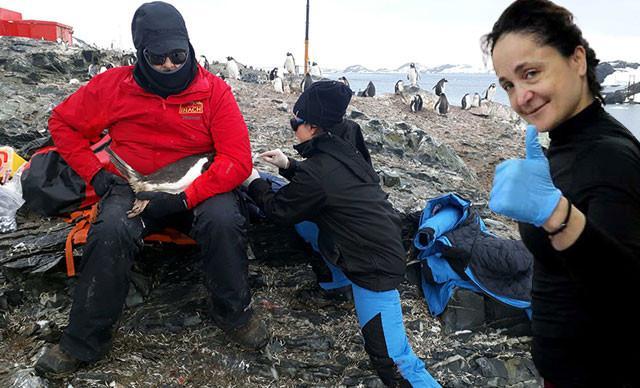
A Turkish professor who participated in the 3rd National Antarctic Scientific Expedition between Jan. 4 and Feb. 14, 2019, found five different bacteria in the eyes of a penguin species called “gentoo penguin.”
“These bacteria are not yet identified or categorized across the world,” said Latife Çakır Bayram from the Erciyes University in Turkey’s central province of Kayseri.
The academic stated that she made intraocular pressure and teardrop tests on the gentoo penguins and took five samples from 100 penguins each.
“I had around 500 samples. I isolated them and came back to Turkey. In our researches in the Erciyes University’s labs, we figured out the unidentified and uncategorized five different bacteria,” noted Bayram.
She thanked a Chilean science team who helped and supported her studies in Antarctica.
“To conduct tests on a penguin, you need to have a team of three people. They let me be a part of a team. First, they were conducting their tests. At the end, I could have around five to six minutes to be able to work on the eyes of the penguins.”
On being asked that “How are the penguins?” she quickly made a comparison with the real penguins and the penguins shown in the blockbuster animation “Happy Feet.”
“They seem cute. They waddle around. But they are not the ‘happy feet.’ They are really strong,” Bayram said.
“A scientist always closes the eyes of the penguin while conducting a test not to scare it. But I was working on their eyes. I really struggled to do so,” she added.
When asked if she ever overcame a dangerous incident, she replied with a “yes.”
“The penguin moved its beak close to my face. The beak was about to hit my eye. Just with a millimeter miss, my eye was saved,” she said.
Turkey has made its first national expedition trip to Antarctica in 2016 with 13 Turkish scientists from various Turkish universities.
The 4th National Antarctic Scientific Expedition, which is the latest one, was in February 2020.
Antarctica, the coldest continent on earth, has served as a scientific research zone since the signing of a 1959 treaty.